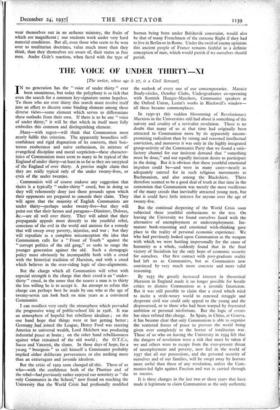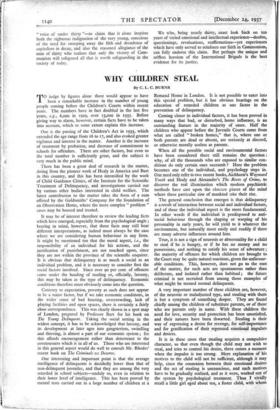THE VOICE OF UNDER THIRTY XI
[The writer, whose age is 27, is a Civil Servant] TN no generation has the " voice of under thirty " ever I been unanimous, but today the polyphony is so rich that even the search for a common key-signature seems hopeless. To those who are over thirty this search must resolve itself into an effort to discern some binding element among these cliverse Viewi—some element which serves to differentiate these outlooks from their own. If there is to be one " voice of under thirty," it will be that which in itself most fully embodies this common and distinguishing element.
Many—with regret—will think that Communism most nearly fulfils this criterion. The apparently boundless self confidence and rigid dogmatism of its converts, their bois- terous .exuberance and naive enthusiasm, its mixture of evangelical diScipline and moral scepticism—these character- istics of COminunism must seem to many to be typical of the England of under thirty—at least in so far as they are untypical of the England of over thirty. A proviso- might claim that they are really typical only of the under 'twenty-fives, or even of the under tiventies.
Communists will of course. endorse any suggestion that theirs Is a typically " under-thirty " creed, but in doing so they will vehemently deny just those grounds upon which their opponents are prepared to concede their claim. They will agree ..that the majority of English Communists are under thirty—perhaps under twenty-five—but they will point out that their heroes and paragons=Dimitrov, Dolores, &c.—are all well over thirty. They will admit that their propaganda' appeals most directly to the youthful rebel, conscious of the evil in the world and anxious for a remedy that will sweep away poverty, injustice, and war ; but they will repudiate as a complete misconception the idea that Communism calls for a " Front of Youth " against the " Corrupt politics of the old gang," or seeks to range the younger generation against the old. Such a demagogic policy must obviously be incompatible both with a creed with the histotiCal tradition of Marxism, and with a creed which believes in the over-riding logic of class-alignments. But the charge which all Communists will rebut with especial strength is the charge that their creed is an " under- thirty " creed, in the sense that the nearer a man is to thirty the less willing he is to accept it. An attempt to refute this charge can perhaps best be made by one who at the age of twenty-seven can look back on nine years as a convinced Communist.
I can recollect very easily the atmosphere which pervaded the progressive wing of public-school life in 1928. It was an atmosphere of hopeful but rebellious idealism ; on the one hand hope that things were at last getting better ; Germany.ihad !joined the League, Henry Ford was steering America to universal wealth, Lord- Melchett was producing industrial peace at home ; on the other hand rebelliousness against what remained of the old world;- the O.T.C.s, Sacco and Vanzetti, the slums. In those days of hope, for a young " bourgeois " to call hiMself a Conununist probably implied either deliberate perverseness or else nothing more than an extravagant and juvenile idealism.
But the crisis of 1929 soon changed all this. Those of us who-.—with the confidence both of the Phariiee and of the rebel—hadfireviously rather enjoyed our notoriety as "the only COtninunist in the School," now found on reaching the University that the World Crisis had profoundly modified the outlook of every one of our contemporaries. Marxist Study-circles, October Clubs, Undergraduates co-operating with Scottish Hunger-Marchers, Communist speakers at the Oxford Union, Lenin's works in Blackwell's window— all these became commonplaces.
In 193o-31 this sudden blossoming of Revolutionary Marxism in the Universities still had about it something of the naivety and crudity of a revivalist revelation. There is no doubt that many of us at that time had originally been attracted to Communism more by its apparently uncom- promising radicalism than by strong and reasoned intellectual conviction, and moreover it was only in the highly integrated group-activity of the Communist Party that we found a satis- factory channel for our insistent demand that " something must be done," and our equally insistent desire to participate in the doing. But it is obvious that these youthful emotional impulses could be—and were in many cases—nearly as adequately catered for in such religious movements as Buchmanism, and also among the Blackshirts. There therefore seemed to be a good deal of truth at that 'time in the contention that Communism was merely the most vociferous of the many creeds that inevitably attracted young men, but that it could have little interest for anyone over the age of twenty-five.
But the continual deepening of the World Crisis soon subjected these youthful enthusiasms to the test. On leaving the University we found ourselves faced with the alternative of unemployment or underemployment. Im- mature book-reasoning and emotional wish-thinking gave place to the reality of personal economic experience. We who had previously looked upon Communism as the weapon with which we were battling impersonally for the cause of humanity as a whole, suddenly found that in the final victory of Socialism lay the only hope of economic security for ourselves. Our first contact with post-graduate reality had left us as Communists, but as Communists now convinced by very much more concrete and more valid reasoning.
By 1935 the greatly increased interest in theoretical Marxism in England made it no longer possible for hostile critics to dismiss Communism as a juvenile fanaticism. But it was still possible to claim that a creed which tried to incite a strife-weary world to renewed struggle and desperate civil war could only appeal to the young and the dispossessed, or to those who had been warped by frustrated ambition or personal misfortune. But the logic of events has since refuted this charge. In Spain, in China, at Geneva, it has become clear that only Communism is able to organise the *scattered forces of peace to prevent the world being given over completely to the horror of totalitarian war. Those of us who on leaving the University in 1934 felt that the dangers of revolution were a risk that must be taken if we and others were to escape from the ever-present threat of unemployment and poverty, now feel in the world of 1937 that all our possessions, and the personal security of ourselves and of our families, will be swept away by horrors more awful than those of any revolution, unless the Com- munist-led fight against Fascism and war is carried through to success.
It is these changes in the last two or three years that have made it legitimate to claim Communism as the only authentic " voice of under thirty "—to claim that it alone inspires both the righteous indignation of the very young, conscious of the need for sweeping away the filth and decadence of capitalism in decay, and also the reasoned allegiance of the man of thirty who realises that only the victory of Com- munism will safeguard all that is worth safeguarding in the society of today. We who, being nearly thirty, must look back on ten years of varied emotional and intellectual experience—doubts, questionings, revaluations, reaffirmations—yet experiences which have only served to reinforce our faith in Communism, can fully endorse this claim. But perhaps the unique and selfless heroism of the International Brigade is the best evidence for its justice.



































 Previous page
Previous page